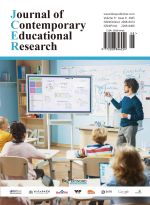Innovative Research on AI-Enabled Innovation of Multiple Evaluation Systems in College English Teaching
Abstract
With the deep integration of artificial intelligence (AI) and education, the reform of college English teaching evaluation has entered a new stage. Traditional college English evaluation systems are faced with problems such as over-reliance on summative assessment, a single evaluation dimension, and lagging feedback. This study explores the innovative path of multiple evaluation systems in college English teaching empowered by AI, aiming to construct a dynamic, comprehensive, and personalized evaluation model. Through literature review, case analysis, and empirical research, it is found that AI technologies such as natural language processing, machine learning, and big data analytics can effectively support the diversification of evaluation subjects (teachers, students, peers, AI systems), the enrichment of evaluation dimensions (knowledge mastery, language competence, learning processes, and innovative thinking), and the intelligence of evaluation feedback. However, challenges such as algorithmic bias, data privacy risks, and the weakening of teacher-student interaction still exist. Finally, this study proposes countermeasures, including optimizing AI algorithms, strengthening data security, and balancing AI and human roles, to provide theoretical and practical references for the reform of college English teaching evaluation.
References
Brown H, 2001, Teaching by Principles: An Interactive Approach to Language Pedagogy (2nd ed.). Pearson Education, Canada.
Black P, Wiliam D, 1998, Assessment and Classroom Learning. Assessment in Education: Principles, Policy & Practice, 5(1): 7–74.
Chapelle C, 2012, Assessing Language through Computer Technology. Cambridge University Press, London.
Dillenbourg P, Jermann P, 2010, Technology-Enhanced Learning. In: Sawyer K (ed.), Cambridge Handbook of the Learning Sciences. Cambridge University Press, 475–491.
Heift T, Schulze M, 2007, Intelligent Computer-Assisted Language Learning: A Survey. Computer Assisted Language Learning, 20(3): 223–250.
Lynch B, 2001, Language Assessment and Program Evaluation. Cambridge University Press, London.
Warschauer M, Matuchniak T, 2010, New Technology and Digital Worlds: Analyzing Evidence of Equity in Access, Use, and Outcomes. Review of Research in Education, 34(1): 179–225.
Zheng C, Li M, 2022, AI-Based Formative Assessment in EFL Writing: A Case Study. System, 106: 102824.
Li Y, Wang H, 2023, Generative AI in College English Writing Assessment: A Comparative Study of ChatGPT and Human Evaluators. Language Testing, 40(2): 215–238.
Chen L, Zhang Y, Zhao J, 2024, Multimodal Data Fusion for AI-Enabled Formative Assessment in EFL Classrooms: Integrating Text, Speech, and Gesture. Computers & Education, 198: 104987.
Zhang Q, Liu J, 2025, Ethical Guidelines for AI-Driven Language Assessment: Addressing Bias, Privacy, and Human Oversight. TESOL Quarterly, 59(1): 89–112.

